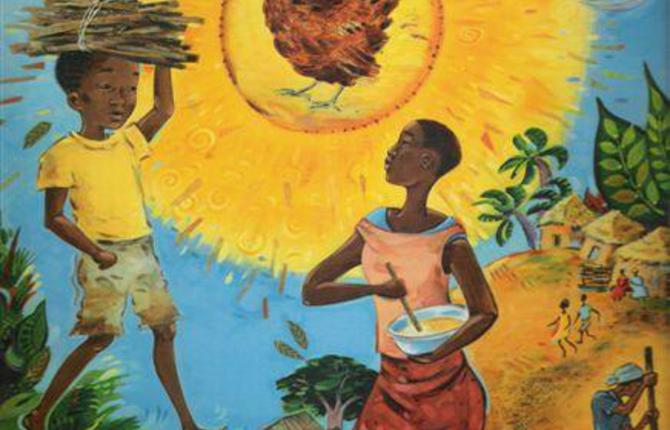
Not your average children
Remarkable children are fascinating. In the following stories we meet children, some from real life, some fictional, who not only achieve more than the average person, but also seem able to endure more hardships.
One Hen (Kids Can Press, $19.95) tells the heartwarming story of Kojo, a small African boy who has a big idea. When his father dies, his mother has to sell firewood to support her son. They have barely enough to live on. Fortunately they live among villagers who practice co-operative lending. The families pool small amounts of money so that one family can use the whole amount to buy something that will help them earn more money. When that family has paid back the loan, it is given to another family.
Kojo’s mother uses her loan to buy a wagon, but a few coins are left over. Kojo begs for them and then buys one hen. By selling the eggs and saving the money until he can buy more hens, Kojo gradually builds up a flock that gives him enough money to pay his school fees. Kojo uses what he learns at school to make more money, but what he really wants is to buy land. For that he needs a loan from a bank. The banker is sufficiently impressed with Kojo’s entrepreneurial spirit that he takes a chance on him – a chance that pays off. Kojo not only repays the loan, he builds up a farm that supports a whole village and begins making micro-loans himself.
Katie Smith Milway’s simple story, brought to life by illustrator Eugenie Fernandes’s vibrant African scenes, makes is easy for children to understand a difficult idea such as microfinancing. It also points out how determination can turn small beginnings into a big success. In the final pages Milway adds information about real-life African entrepreneurs and about the organizations, such as World Vision, who give small loans so that poverty-stricken Africans can learn to help themselves. This is an eye-opening and important book for children and parents alike.
Kojo’s spirit and feistiness is typical of child labourers down through the ages. In Sarah Ellis’s Days of Toil and Tears: The Child Labour Diary of Flora Rutherford, 1887 (Scholastic Canada, $14.99) we meet 11-year-old Flora who has grown up in an orphanage. To her utter joy her Aunt Janet, who is now married, living in the small Ontario town of Almonte, and working at the spinning mill, sends for her. That Flora will also have to work in the mill doesn’t bother her one bit. Being part of a family has always been her dream. Aunt Janet and Uncle James turn out to be all that she had hoped for, but work in the mill is hard and dangerous. Flora is a doffer, which means she takes the full bobbins off the spindles and replaces them with empty ones, but sometimes she has to crawl under the machinery while it is moving to twist together broken threads. Only children are small enough to do this but they have to be quick and deft to avoid being mangled by the moving belts and gears. Despite the dangers, Flora is happy, and then her uncle has an accident at the mill, changing all of their lives drastically.
Sarah Ellis takes us back to an almost forgotten part of Canadian history where workers have no rights, bosses are exploitive and many children have to leave school and work in dangerous conditions to help their families survive economically.
In Wonder Kids (Annick Press, $24.95) Charis Cotter tells about the remarkable lives of nine child prodigies some of whom, like pianist Clara Schumann and comic Buster Keaton, had careers on the public stage and others, like Fanny Mendelssohn, talented sister of the much more famous Felix, and Phillis Wheatley, slave to a Boston family and an extraordinary poet, were forced by circumstances to see their talents ignored. Cotter not only shows how these talented children worked hard to perfect their art, she also puts their lives into the context of their times. She points out, for example, that even though from early childhood Phillis Wheatley had a quick and enquiring mind, the greater wonder was that she was bought right off the slave ship by an extraordinary family, one that believed in education, were thrilled with her ability to learn languages quickly, and were prepared to ignore pre-American Revolution society’s hostility towards the idea of educating slaves.
Each of these nine prodigies had their talents both fostered and exploited by an important adult in their lives. But each of them, also, had the drive and desire to work hard at developing their talents.
Stories of great endeavour give our children role models to emulate but they also remind us that we have to protect the more vulnerable members of society.





